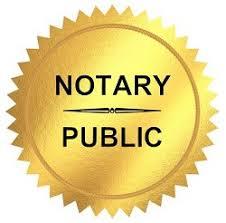Managing Deceased Estate Issues: Support With Legal Procedures
Managing Deceased Estate Issues: Support With Legal Procedures
Blog Article
Debunking Notarial Work: Simplifying the Duty and Importance of Notaries
In the intricate web of legal documentation and confirmation, notaries stand as pillars of assurance and credibility. Their function, usually shrouded in mystery for many, carries considerable weight in making certain the validity and integrity of important papers. As guardians of legitimacy and reality, notaries play an essential component in our culture, yet their job is not always completely comprehended. By unwinding the intricacies shedding and surrounding notarial practices light on the importance of their acts, a more clear understanding emerges of the essential role notaries play in maintaining the material of legal and lawful arrangements.
The Background of Notarial Work
The background of notarial work dates back to old civilizations, where scribes played a crucial duty in taping important details and verifying files. This led to the development of notaries, individuals appointed by the state to act as neutral witnesses in legal issues.
During the Center Ages, notaries gained prominence in Europe, with their features broadening to consist of composing lawful records, certifying signatures, and preserving records. The rise of global trade even more highlighted the relevance of notarial job in verifying contracts and agreements throughout borders.
In the contemporary age, notaries remain to play an essential function in legal and service purchases by validating identities, confirming the credibility of records, and protecting against fraud. Their function in licensing the validity of arrangements adds a layer of security and trust fund to the ever-evolving landscape of business and legislation.

Tasks and Duties of Notaries
The historic advancement of notarial job from old human beings to the modern-day age has actually formed the distinctive duties and obligations that notaries promote in lawful and service purchases today. Notaries play a vital duty in validating the credibility of papers and the identification of signatures. Among their primary responsibilities is to witness the signing of essential documents, such as deeds, agreements, and wills, to make sure that all events are getting in right into contracts intentionally and voluntarily. Notaries also confirm that signatories are of sound mind and not under pressure or coercion.
They accredit duplicates of initial documents, giving guarantee to organizations that the copies are real reproductions of the originals. Generally, the responsibilities and duties of notaries are vital in guarding the honesty and legitimacy of numerous papers and deals - Apostille.
Notarial Certificates and Signatures
Exemplifying thorough attention to information, notarial certifications and trademarks function as crucial components in confirming the authenticity of lawful files. Notarial certifications normally contain important information such as the date of registration, the names of the notaries, a description of the paper, and the notary's main seal. These certifications offer a clear document of the notarial act, guaranteeing that the file can be easily determined and traced back to the notary that managed the process.
Signatures play a critical function in notarial job, as they signify the contract and approval of the events included. Notaries carefully witness the signing of files to confirm the identification of the signatories and validate that they are authorizing of their very own free choice. By affixing their official seal and trademark to the file, notaries certify that see page the required procedures have actually been followed and that the record is enforceable and legitimate.
Essentially, notarial certificates and trademarks are the trademark of authenticity in lawful deals, supplying assurance to all celebrations entailed that the useful site papers are legit and binding.
Significance of Notarial Acts

Registration Refine Described
The registration procedure commonly begins with the individual presenting the record to a notary public. As soon as the identity is confirmed, the notary makes sure that the individual review signing the record does so voluntarily and without any kind of browbeating.

Conclusion

Notarial certifications generally consist of important information such as the day of notarization, the names of the signatories, a description of the paper, and the notary's main seal. These certificates offer a clear document of the notarial act, ensuring that the document can be easily identified and traced back to the notary who managed the procedure.
By attaching their main seal and trademark to the document, notaries certify that the necessary treatments have actually been followed and that the document is valid and enforceable.
By verifying the identity of the notaries, verifying their readiness to get in right into the contract, and accrediting the date and place of the signing, notaries play a critical function in maintaining the credibility of legal files.After the file is authorized, the notary will affix their official seal or stamp onto the paper.
Report this page